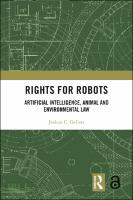Rights for Robots
Artificial Intelligence, Animal and Environmental Law (Edition 1)
Author(s)
Gellers, Joshua C.
Collection
Knowledge Unlatched (KU)Language
EnglishAbstract
Bringing a unique perspective to the burgeoning ethical and legal issues surrounding the presence of artificial intelligence in our daily lives, the book uses theory and practice on animal rights and the rights of nature to assess the status of robots.Through extensive philosophical and legal analyses, the book explores how rights can be applied to nonhuman entities. This task is completed by developing a framework useful for determining the kinds of personhood for which a nonhuman entity might be eligible, and a critical environmental ethic that extends moral and legal consideration to nonhumans. The framework and ethic are then applied to two hypothetical situations involving real-world technology—animal-like robot companions and humanoid sex robots. Additionally, the book approaches the subject from multiple perspectives, providing a comparative study of legal cases on animal rights and the rights of nature from around the world and insights from structured interviews with leading experts in the field of robotics. Ending with a call to rethink the concept of rights in the Anthropocene, suggestions for further research are made.An essential read for scholars and students interested in robot, animal and environmental law, as well as those interested in technology more generally, the book is a ground-breaking study of an increasingly relevant topic, as robots become ubiquitous in modern society.
Keywords
Law; General; Computers; Artificial Intelligence; General; Law; EnvironmentalDOI
https://doi.org/10.4324/9780429288159ISBN
9780429288159Publisher
RoutledgePublication date and place
2020Grantor
Imprint
RoutledgeClassification
Jurisprudence and general issues
Artificial intelligence
Environment law


 Download
Download